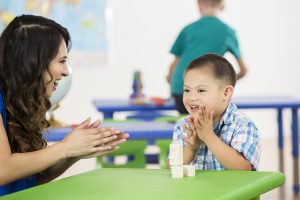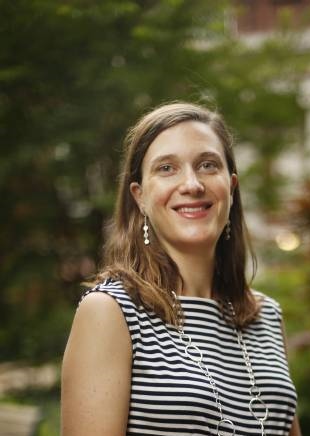For Erin Barton, child’s play is serious business.
Children with disabilities—particularly those with autism—are known to have delays in play and to play differently from children developing typically. They are less likely to take part in complex play, which can be crucial for social interactions and for engaging in inclusive, typical settings.
“We want children with disabilities to engage in the same settings as their peers, so that they become full, participating members of society,” says Barton, assistant professor of special education at Vanderbilt’s Peabody College of education and human development. “If children interact with materials and toys in meaningful ways, then teachers can focus on advancing their communication skills or advancing their cognitive skills through activities like counting or matching.”

Barton’s work focuses on instructional practices, and most of those have been related to play behavior. She has studied increasing the complexity and frequency of play for children with disabilities.
“I became very interested in teaching children with disabilities play behavior as a Chicago Public Schools teacher with a class of children with autism,” she says. “Many of my children had goals related to play or goals around social skills or goals around language but didn’t have the skills to engage in play.”
Much of Barton’s early research encompassed pretend play. Children using objects as if they’re something else, for example, or pretending to be somebody else or using toys functionally but with some pretending involved. As children learn more complicated play, they are also learning to use language. Engaging in pretend play is seen as a developmental milestone.
Barton has also compared different types of interventions for increasing basic play with young children who have multiple and severe disabilities, teaching them to interact with objects. Peabody’s Susan Gray School has provided an ideal environment for her research.
“I came to Peabody because I wanted a place where I could both learn a lot about conducting high-quality research and participate in a first-class, inclusive early childhood setting, which was the Susan Gray School. I’m really grateful for all the children and families who have participated.”

A recent study Barton conducted at Susan Gray explored imitation and play expansions, pairing children with and without disabilities to play with blocks. Blocks and block play are ubiquitous in early childhood settings and provide a typical context for social interaction. Study results indicated that levels of play complexity increased for children with disabilities only when researchers prompted them. Results for typically developing peers were variable.
Barton’s team is now looking at different ways to teach children to play board games, again pairing children with disabilities with typically developing peers.
Training teachers to implement play behaviors is also important. Barton studies different ways to coach teachers in effective procedures. Several of her studies highlight the fact that when teachers don’t use the procedures with high fidelity to an intervention’s design, children don’t increase their play skills.
A focus on inclusion goes hand in hand with Barton’s interest in teaching play skills to children with disabilities.
“As an undergraduate, I did a series of practica at the Child Development Lab in Urbana, Illinois,” she says. “That was really seminal for my future in special education. I worked in a toddler classroom and in one for four-year-olds. Both classrooms included one or two children with disabilities. That was a new concept for me.
“I saw how beneficial inclusion was, not only for the children with disabilities but for their peers in the classroom and for all the families. I knew that I wanted to figure out the best ways to include children with disabilities in environments with their typically developing peers.”
Barton has found that many educators and even families believe that inclusion isn’t going to work, or that inclusion isn’t effective for children with disabilities. Some even believe that inclusion is detrimental for children with typical development.
“We know those things are not true. In fact, we know the reverse is true. High-quality inclusive environments are good for all children. I also believe that it’s an issue of social justice—children with disabilities need access to such environments, just as children with typical development do.”
There’s an app for that
In September, Professor Erin Barton received a three-year, $1.5 million grant from the Institute of Education Sciences (IES) to develop and pilot test a mobile app, the Family Behavior Support App, aimed at supporting parents in carrying out interventions with their young children with disabilities and challenging behaviors in home settings.
Working with colleagues at the University of Illinois Urbana-Champaign and the University of Massachusetts Boston, Barton will create an app designed to take families through identifying what a challenging behavior looks like, what daily routines trigger the behavior, and what happens right after the behavior. The app will generate a list of strategies that families can use to prevent and also reduce the challenging behavior over time.
Families will be able to control what information the professional team can access, but it will also allow families to communicate with everyone working with their children.